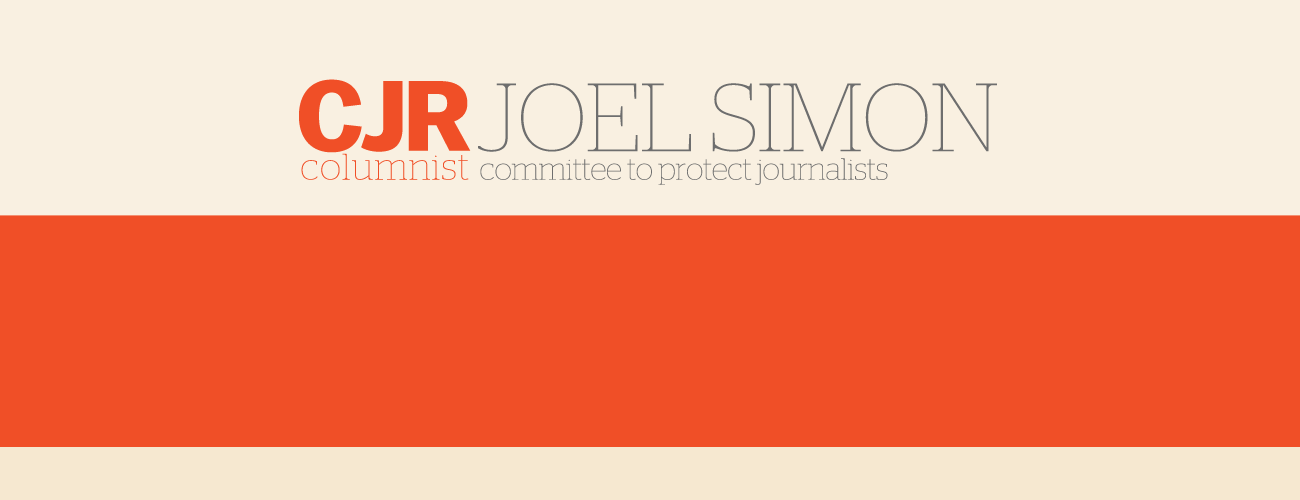Sign up for The Media Today, CJR’s daily newsletter.
The visit from the two Russian bailiffs was hardly a surprise.
For months, the fines against the US-funded broadcaster Radio Free Europe/Radio Liberty for failing to comply with Russia’s “foreign agent” law had been accumulating, until they topped $2.3 million. The bailiffs had shown up at the Moscow office May 14 to begin the legal process that would allow Russian authorities to seize RFE/RL’s assets, and eventually shut down their operations in Russia. That action could come as soon as this week.
For the Russian government, information is a political tool, to be managed and controlled domestically and deployed against adversaries abroad as part of a destabilizing strategy. In the first decade after Vladimir Putin came to power, at least 17 journalists were murdered and independent media was brought under state control. Today the threats in Russia have evolved. Government regulation is the primary tool of oppression.
Unfortunately, US authorities have handed Russia the perfect cover for its repressive strategy—reciprocal enforcement of laws requiring certain media to register as foreign agents. In 2017, the US Justice Department determined that Russian media operating in the United States, notably RT and Sputnik, were not journalistic enterprises but state-sponsored influence operations. As such, they were required to register under a 1938 law called the Foreign Agents Registration Act, or FARA. The law had generally been used to bring transparency to government lobbying. Applying it to media outlets required a new interpretation.
The Justice Department argued that its intention was not to stifle RTs free expression—it could still broadcast whatever it liked—but rather to ensure that American news consumers had the information they needed to make informed decisions. Under the law, foreign agents are required to register with the DOJ and label their content, though the latter provision has not been consistently enforced.
The FARA determination may have been legally sound and was borne of a legitimate concern—namely that foreign governments seek to influence American elections through the dissemination of false or misleading information. But as a matter of public policy, FARA labeling has been a disaster. While doing nothing to stem disinformation in the US, the designation provided an opportunity for the Putin government to crack down on critical media under the guise of reciprocity. Under its own draconian Foreign Agents law, passed by the Russian Duma in 2012 and subsequently revised to apply to media, designated outlets must include a statement that they are “performing the functions of a foreign agent.”
RFE/RL, which was kicked off the airwaves in Russia in 2012, now relies primarily on social media and viral video to reach Russian audiences—most recently, for example, by livestreaming protests calling for the release of Alexei Navalny in January. RFE/RL also documented the scope of the COVID-19 outbreak in Russia, which Putin has sought to downplay and cover up.
RFE/RL calls the requirements that it include lengthy disclaimers on all of its content crippling, and has refused to comply. It is pursuing a claim with the European Court of Human Rights alleging violations of the right to free expression. Meanwhile, the fines continue to mount. Funded by the US Congress but editorially independent, RFE/RL has launched a public campaign and enlisted the support of senior US officials, including Secretary of State Antony Blinken, who pledged support for RFE/RL and said the US “stands strongly with independent journalism.” Blinken reinforced that message in a meeting with Russian Foreign Minister Sergei Lavrov in Iceland last week. (In a statement, the Committee to Protect Journalists called for Russian authorities to unfreeze the accounts belonging to RFE/RL.)
Russian officials were unimpressed, and seemed to escalate their repressive action against RFE/RL in response to US pressure. They have also begun applying the foreign agents law to online Russian media outlets, including the innovative Meduza, which received international funding. “I would like to remind my American colleague that we didn’t start the game of foreign agents,” Foreign Ministry spokesperson Maria Zakharova wrote on Facebook on April 30. “It was started by the United States of America. Russia has mirrored the unjustifiably restrictive measures taken by the U.S. authorities in relation to the Russian media by developing its own law on foreign agents.” Such feigned indignation is even more galling in light of Russia’s approval for actions taken by its ally Belarus, which recently hijacked a Ryanair jet and arrested dissident journalist Roman Potasevich .
It might be tempting in the current climate for the US government to tighten FARA requirements for Russian media operating in the US. But any such effort is likely to precipitate a race to the bottom as Russia takes further reprisals against US media organizations operating in their country. That’s what happened in China. When the Trump administration began limiting visas for Chinese journalists and media outlets engaged in propaganda. China retaliated by expelling reporters from The New York Times and Wall Street Journal.
Fighting the pernicious and destructive influence of foreign propaganda in the US is a necessary undertaking, but restricting or regulating the work of the international journalists in this country is a losing strategy. Not only is it ineffective, it cedes the moral high ground while opening the door to restrictions on US journalists in the name of reciprocity. The best approach for the Biden administration is to review its interpretation of FARA and to rescind the registration requirement for media organizations. It should challenge Russia to do the same. The Putin government will undoubtedly find another pretext to justify its media repression and the US will have to confront the next challenge. But if the US is to engage credibly in the global struggle for press freedom, it must make clear that it is fighting for a principle and will not play Russia’s cynical game.
Has America ever needed a media defender more than now? Help us by joining CJR today.



